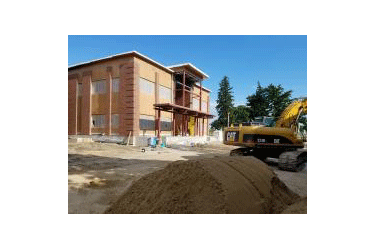Construction on U of I building to shut down (again) on July 1

URBANA, Ill. – Plagued by the state’s budget impasse, the Integrated Bioprocessing Research Laboratory at the University of Illinois will shut down for the second time on July 1. Contractors have received written notifications from the Capital Development Board to prepare the site for demobilization.
Officials at U of I report that the budget for IBRL increased by nearly 30 percent after the previous yearlong stoppage. They are concerned that an extended delay at the present state of construction will result in much more extensive rework with unknown cost escalation to the $32-million project.
According to IBRL Director Vijay Singh, the building was scheduled to open for business in spring 2018.
“We’ve made great progress after recovering from the first shutdown. That momentum will be lost, as attention shifts to protecting the building rather than foundational project scoping,” Singh says. “Relationships that we’ve built with industrial partners will undoubtedly suffer major setbacks and exciting prospects for economic development related to bioprocessing and bio-products in Illinois and along the I-72 biocorridor will be delayed.”
Singh adds that federal and industrial research projects that were expected to begin in 2018 will be postponed or cancelled. Companies, which had set aside monies for projects, will likely look elsewhere for scale-up work.
The remaining days of June will be unproductive toward completion of the building as the work focus becomes securing it against weather and vandalism. Singh also notes that delays like this are compounded because contractors move on to other projects, disrupting the restart of the project.
IRBL is a part of the Department of Agricultural and Biological Engineering in the College of Agricultural, Consumer and Environmental Sciences. ACES Dean Kim Kidwell says this second halt on construction could have serious long-term consequences.
“It’s not just about a building,” Kidwell says. “Obviously, we’ll need to postpone hiring staff to operate the facility, but there is also the potential for the loss of very talented faculty and scientists as they consider other opportunities. Illinois will be challenged to retain and recruit talent working in the industrial biotech space. Enrollment in the Professional Science Masters (PSM) program in bioprocessing and other related majors may suffer from the lack of available facilities and faculty.”
Kidwell adds, “It is an ironic twist that the construction on this building, which is to be a catalyst for innovation, is stalled not once, but twice. It’s disappointing, not just for the College of ACES, but also for the state of Illinois’ efforts to be a leader in renewable bioprocessing technologies.”